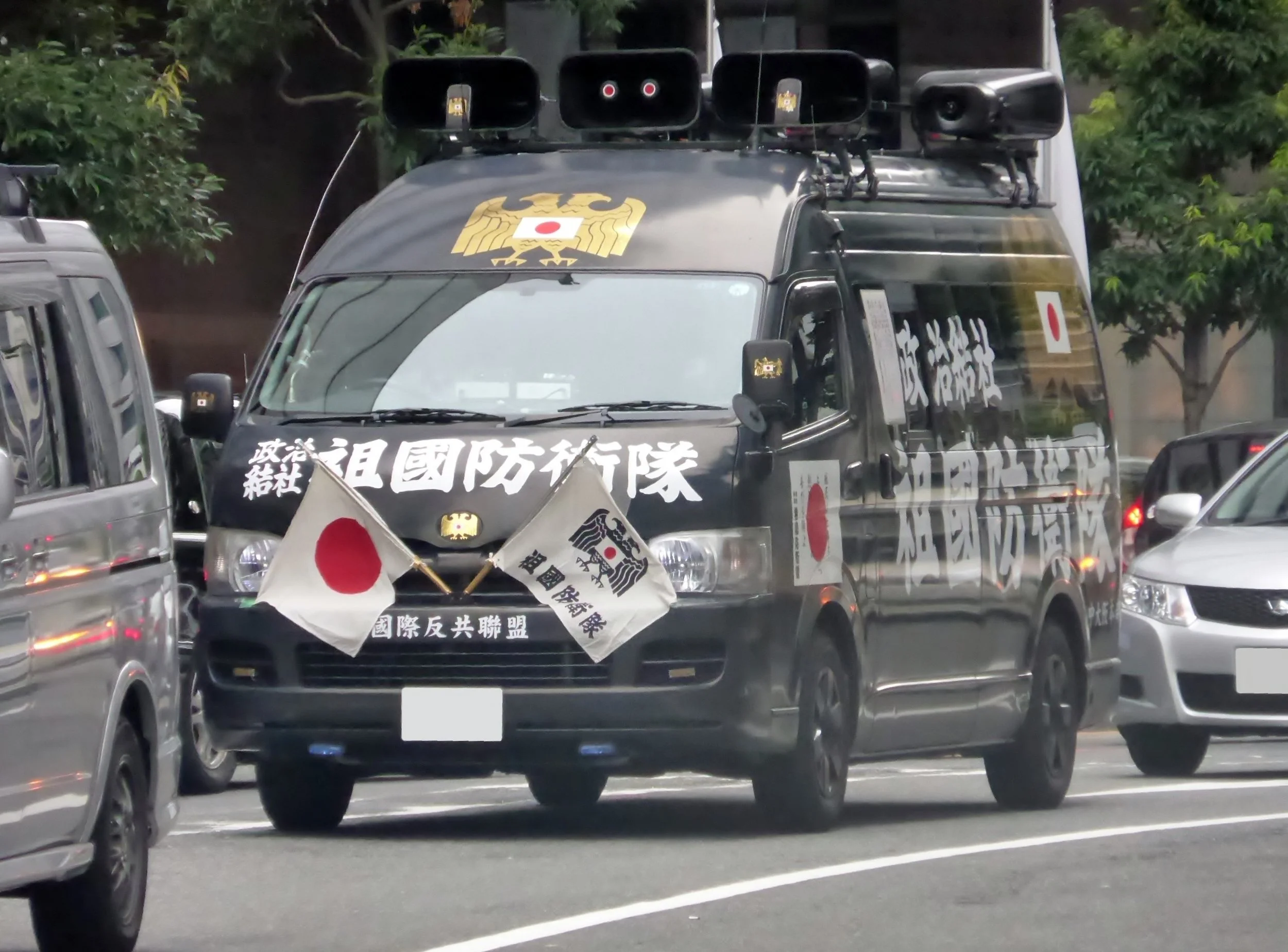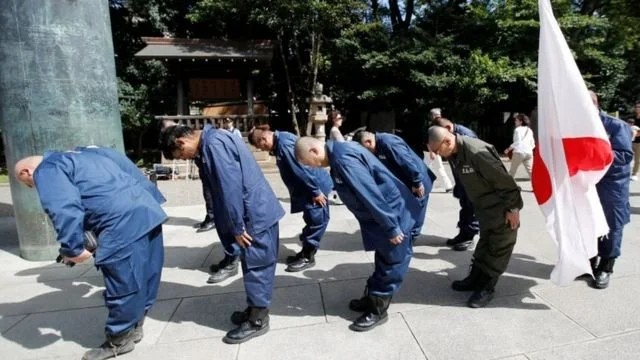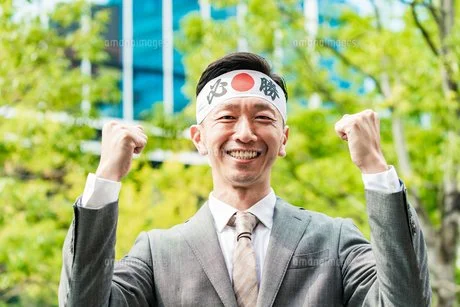Loudmouths
The “Japan National Guard” (Sokoku Boeitai; 祖国防衛隊) on the go. But what’s with the two-headed “imperial eagle”?
Speech is silver, silence is golden
(Yūben wa gin, chimoku wa kin; 雄弁は銀、沈黙は金)
In the spring of 1989 I was in an office high above Hibiya Park in central Tokyo, learning how to be a functionary at Kawasaki Steel Corporation. My desk was in the international section (which seemed charged mainly with translation duties) of a company that was struggling to adapt to the increased localization (genchika; 現地化) of the steel industry. Few could tell that 1989 essentially marked the end of Japan’s postwar period of rapid economic growth and the beginning of an economic slump that dragged on for decades. An American in the section, Mr. Hart, had his desk next to mine. Hart had been in Japan for quite some time. His suit hung limply on his thin frame. Nothing seemed to excite or particularly interest him. He was jaded and world-weary to the bone. He was also the only other American working at Kawasaki Steel headquarters. His insight and guidance were invaluable to me.
Since I had little experience of working in the central business district of a Japanese city, I was unfamiliar with the phenomenon of the gaisen-sha (街宣車): the political sound truck. Even a dozen or more floors above street level, in the middle of the workday, with the windows of the office building tightly sealed, the din of the sound trucks parked far below shattered the hush of the office. This happened quite often, and I became curious about the sound trucks and the men (no women, of course) who drove them and ranted through the megaphones.
The vehicles were usually larger-size vans and sometimes actual trucks, their sides painted with slogans which, at the time, I did not understand. Sometimes the trucks had a decidedly military appearance, painted black or olive drab. Some even sported anti-grenade mesh over the darkened windows. I could certainly recognize variations of the Japanese flag, including the war-era “rising sun” flag. I soon learned that these trucks were operated by far right groups known as uyoku dantai (右翼団体; right wing organizations). Their demands included restoration of the Japanese imperial family as head of a unified and “pure” nation; a burning hatred of communism and Marxism (along with the Nikkyōso, the famously left-leaning Japan Teachers Union); and a demand for the return from China of the Senkaku islands (尖閣列島; Diaoyu in Chinese) located between Taiwan and Okinawa in the far south of Japan, and from Russia of the Kuril Islands (Chishima rettō, 千島列島) extending to the northeast from Hokkaido toward the Kamchatka Peninsula. The far right has also demanded that the postwar constitution be scrapped, especially the hated Article 9:
Aspiring sincerely to an international peace based on justice and order, the Japanese people forever renounce war as a sovereign right of the nation and the threat or use of force as means of settling international disputes.
In order to accomplish the aim of the preceding paragraph, land, sea, and air forces, as well as other war potential, will never be maintained. The right of belligerency of the state will not be recognized.
The right truly loathes this renunciation of “war as a sovereign right of the nation.” The Japanese constitution was essentially written by a committee of the U.S. Occupation forces after the war. One could argue that the constitution is a gift to Japan and, if so, Article 9 is its crown jewel.
It turns out that many of these uyoku dantai are in fact fronts for organized crime, the notorious yakuza (famous for lopping off the fingers of disloyal gang members). Belligerence is their stock-in-trade, so it’s only natural that these groups would prefer to see Japan reorganized as an organized crime group.
Bowing low at the Yasukuni Shrine in Tokyo, infamous for enshrining Class A war criminals
What struck me about the gaisen-sha was the sheer decibel level of their hectoring and the gunka ( 軍歌, “army songs”) they would blast through their loudspeakers. Why on earth would the police let them get away with this noise pollution? Why do ordinary citizens tolerate this auditory assault?
Hart had an interesting theory about this. I don’t know if he originated the theory or if he’d heard from someone else, but it went something like this: First of all, many police are rather sympathetic with the views espoused by the uyoku. (Which brings to mind the words – possibly apocryphal – of a certain Southern demagogue from many years ago who said: “We got to get the thugs off the streets and into the po-lice department where they belong!”
But the most interesting part of Hart’s theory focused on the eardrum-shattering noise from the gaisen-sha along with the pseudo-military uniforms, the men hiding behind sunglasses, the kinky permed hair, the tackiness of their performance. By allowing the right wing to exercise its right to free speech, even at the cost of trampling everyone else’s right to retain their hearing, the authorities were sending a message to ordinary Japanese citizens, as if to say: “OK: this is what political engagement looks like. Isn’t it ridiculous? Embarrassing? Is this something you want to take part in? Of course not!”
The upshot is that for ordinary Japanese citizens, political speech is the province of loudmouths, bullies, and lowlifes. Thugs, gangsters, assorted losers. Best to leave politics to the pros in the Liberal Democratic Party (LDP). Vote in parliamentary elections…if you feel you must. But, for better or worse, the country is best off in the hands of crooks who are at least competent, who wear tailored suits, and who do not fill the streets with a lot of silly noise. (Except at election time, when less martial-looking sound trucks circulate endlessly through the streets of every city, town, village, and hamlet, blasting out the names of mainstream and fringe candidates alike, followed by a hearty and ear-splitting yoroshiku onegai shimasu!!! {which here suggests something like “don’t forget me on election day!”}.)
Victory is assured! (I think…)
All in all, the message is that politics is the domain of uncouth loudmouths. As a middle-aged Japanese university professor told me many years ago: “I don’t think we should examine politicians too closely because it would be like beating an old rug too vigorously, releasing all the dirt and insects .”
Maybe we shouldn’t judge the Japanese too harshly for their dismissive attitude toward politics and politicians. After all, wasn’t it the U.S. that placed an uncouth, loudmouthed gangster in the White House for four years and seems all too ready to do it again? The saner people among the American electorate might consider importing a few platoons of Japanese right-wing street thugs, dressing them up in clown suits, MAGA hats, and dark sunglasses, deploying them across the country to underscore the preposterousness of Trump & Co.
Toranpu, Toranpu, Toranpu de gozaimasu! Yoroshiku onegai shimasu!!!!
トランプ、トランプ、トランプでございます!よろしくお願いします!!!
MAGA-men



